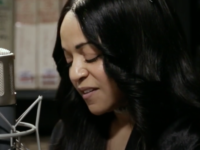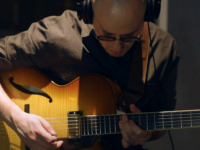Luke Reynolds, the Grammy-nominated, Brooklyn-based, Vermont-born singer-songwriter, today released a deeply intriguing new guest-packed album called Before the Flood.
Perhaps best known for his tenure with Guster since 2010, Reynolds has also led Pictures and Sound, and Blue Merle — the latter of which played Lollapalooza, Bonnaroo and Farm Aid in 2005-06. Willie Nelson was then a featured performer with Reynolds’ subsequent Pictures and Sound project in 2008.
After the Flood, his first release since 2010’s Maps, features guest turns by members of My Morning Jacket, The War On Drugs, and others. The album is available on vinyl and digitally through Luke Reynolds’ online store.
Preston Frazier caught up with Reynolds for an exclusive Something Else! Sitdown to talk about After the Flood and how it connects with, and advances, his well-regarded career …
PRESTON FRAZIER: Tell us about your background. Where were you born and raised? When did you start to play music? Any formal training?
LUKE REYNOLDS: I grew up in Cornwall, Vermont, in a geodesic dome that my parents built when they were 20. I am a sixth-generation native Vermonter. My mother is a teacher; my father was a computer programmer at our local hospital who retired a few years back, and also builds guitars and boats. My younger sister lives out west. Our family was very close growing up. We spent alot of time outside together, very little TV, no national newspapers in the house. Lots of independent time out in the woods, family dinners every night, art, fishing, reading.
PRESTON FRAZIER: Who are your musical influences?
LUKE REYNOLDS: The new record, After the Flood, was inspired by Stephen Hawking and French symbolist poets like Rimbaud, Baudelaire, Verlaine). As for music, I made lists of everything I was listening to while I was writing, and I hung them from the walls of my tiny 8×10 apartment, and brought those lists with me into the studio while we were cutting, and hung them over the console: Scott Walker, Beachwood Sparks, Richard Swift, the Impressions, Latin Playboys, Mark Ribot y Los Cubanos Prostzos, Thurston Moore, Ry Cooder, Junion Kimbrough, Marvin Gaye, Jim O’Rourke, Johnny Burnette Trio, the Beach Boys.
PRESTON FRAZIER: How did you form Blue Merle? Why did you disband the group?
LUKE REYNOLDS: Blue Merle was the forward thinking, acoustic-driven band that I founded with upright bassist Jason Oettel, in Nashville, Tennessee in 2002. Jason and I met and bonded over our shared admiration of acoustic virtuosos Tony Rice, Edgar Meyer, Stuart Duncan and Tim O’Brien. It was during a really special time in Nashville; there were so many great young players new to town. Luke Bulla was playing with Ricky Skaggs, Casey Driessen with Steve Earl. Some of the Nickel Creeks still lived there then, and some of the members of Punch Brothers were just moving to, or getting ready to move to town. All of our heroes took us in under their wings. There were jam sessions every night. Blue Merle was born out of that community of young players.
It’s pretty unique in hindsight, to think that Island Records signed us. We were into Gillian Welch, had a fiddle and mandolin in the band, and they were signing emo bands up in New York City. I tell people that recording our first and only LP, Burning In The Sun, was like losing your virginity to the music business in the best possible way. We felt little pressure from anyone at the label while we were making that album. It was one of the most pure, and fun windows I have ever experienced in the music business. We made that album with producer Stephen Harris [U2, Ben Kweller], who was a great mentor and friend, with almost no one watching us. The band parted ways in 2006, for all the normal reasons a band parts ways. After the record came out, growing pressure from the record label and our management took all the fun out of it, and made it very hard to continue. I have alot of respect for my bandmates, and I’m proud of all the work we got done, while we were still together.
PRESTON FRAZIER: Discuss your involvement with Guster. How did it come about? What is on the horizon with the band?
LUKE REYNOLDS: Funny enough, I met Guster at Sound Emporium Recording Studios in Nashville while Blue Merle was recording our very early demos across the hallway in Studio B. They were making Keep It Together with producer Roger Moutenot [Yo La Tengo] in Studio A. We both had the same booking agent, Scott Clayton at CAA, and I remember thinking those guys seemed like the coolest older brothers on the planet. I watched how they got along, and liked it. They were also the very first band to invite Blue Merle out on tour. We went and played a week of college dates with them. I loved their crew; I loved their whole family vibe.
Fast forward eight years to 2010, and I got a call from all of them — including Joe Pisapia –, that Joe was going to be leaving the band to produce a k.d. lang record, and did I want to join the band as multi instrumentalist? At the time, I was living in Topanga Canyon, California, in a little cabin on a horse farm, was going through some really big life changes — and had just finished a record, Maps. I was looking for my next move. They told me they weren’t going to hold auditions; they just wanted me to join. I said yes, put everything I owned into a climate-controlled storage unit in Santa Monica — including 30k worth of guitars, and all my recording gear — and flew east for rehearsals.
Now it’s 2014, and we’re sitting on a new Guster record which comes out in January, Evermotion. The band is saying it’s the best album they’ve made yet, and I’m proud of my contributions on the writing front, and in the studio. Richard Swift produced it, and Phil Ek mixed it. Both of those guys, I have wanted to work with for a very long time. Even though it took almost three years to write the album, my thought is that, however long it takes to write the record, just take that time — even when it feels like forever. Recording happened very fast with Swift; we did almost a track a day. From what I’ve heard, that is a very different way of recording for the band, compared to how they’ve made records in the past, and was very freeing.
PRESTON FRAZIER: How does After the Flood differ from the Pictures and Sound project or Maps?
LUKE REYNOLDS: After the Flood feels like a massive step forward, and at the same time a very natural progression from my previous two albums, Pictures And Sound that I made with Jacquire King, and Maps with Brad Bivens — expanding into more psychedelic territory, both lyrically and sonically, like in the new song, “Inside The Light.” All three albums were cut to tape, which changes for me the feeling of the actual process of tracking. After the Flood feels more explosive and adventurous. Check out the outro of “A Million Miles Away,” or the lyrical imagery in “From The Bottom Looking Up.” On this record, Brad Bivens — who I co-produced the album with — and I spent alot of time working with plate reverbs and echo chambers around the country, to get the sound we wanted.
PRESTON FRAZIER: Does living in New York City influence your music?
LUKE REYNOLDS: For me, one thing about New York City is that when it comes to art/fashion/self expression, what might feel radical or “outsider” elsewhere, feels very normal and inside here. So, somehow that frees one up, to feel encouraged to stretch out a bit, from dialing in an abrasive guitar tone that at first feels out of place — to expanding an outro into a 32 bar form that never repeats, like I did in the song “Late At Night.” I wrote this record in a very small apartment; the floorplan wasn’t much bigger than two sheets of plywood.
PRESTON FRAZIER: Describe how you set about recording After the Flood. How did the project evolve?
LUKE REYNOLDS: I decided to make a record when I looked at the calendar and saw that I had about four months open before Guster went back on the road. I wanted to do something new, and stretch, so I read everything I could get my hands on about space and cosmology, and the French symbolist poets, and set out to write a record that felt more free and adventurous than anything I’d ever done. Basically, I wanted to write the kind of music that I would seek out elsewhere, if I knew someone else somewhere were writing those kind of songs. After I had an albums worth of material written, I cashed in ten years worth of frequent flier miles, and flew in my favorite players from all over the country to track After the Flood in Brooklyn. I was adamant that I did not want to make demos. I only wanted to cut masters. I had everything written and arranged before the band got there. Many songs on the record are first takes.
PRESTON FRAZIER: What is your favorite track on After the Flood, and why?
LUKE REYNOLDS: “A Million Miles Away,” the album opener, feels to me like one of the most important pieces of music I’ve ever created. There’s really no chorus, just hooks. Every part that every musician is playing is a hook on its own. I’m really proud of the work we did combining room mics, and plate reverbs, and echo chambers, to create the sonic landscape for that song to exist in. The lyrics feel very open ended to me, ever part of that song feels like a discovery. The playback of the basic track when we were first cutting takes had so much raw power right off the floor that some musicians in the room — I won’t say who — said it was one of the best basic tracks they’d ever heard.
PRESTON FRAZIER: Do you anticipate live gigs in support of After the Flood?
LUKE REYNOLDS: Yes. Right now, I’m working to put together a new model of presenting music from After the Flood, in a way that feels more of all inclusive as an experience for fans. The first presentation will be in November in New York City, at a recording studio, where we’ll blast the record at full volume — which is as physical an experience as it is sonic — discuss the way the album was recorded and written, and perform stripped-down versions of the songs, as they were when first they were written. If this model works in New York City, this would be a cool new way to present this music all over the country.
- Nosotros, “Mentiras” (2024): One Track Mind - April 10, 2024
- Nick Finzer, Christian Fabian, Rachel Z + Others: Five for the Road - April 5, 2024
- Terry Blade on ‘Ethos: Son of a Sharecropper’: Something Else! Interview - March 10, 2024




